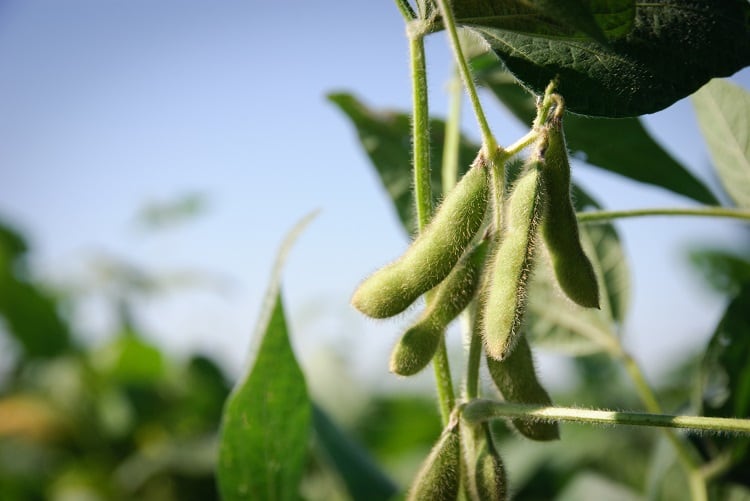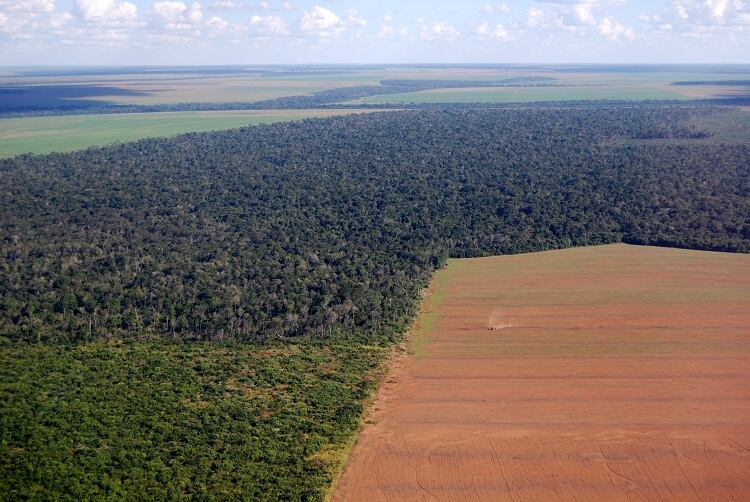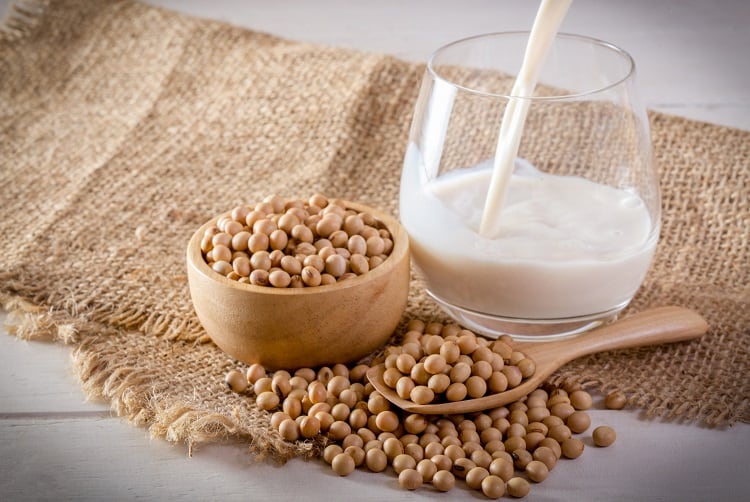Global soy production is estimated at close to 250 million metric tonnes per year, with the US, Brazil and Argentina accounting for approximately 80% of this staggering figure.
The bean serves as a key source of protein for both human and animal consumption, and are also pressed to extract soybean oil for cooking.
Yet the industry is wreaking havoc in soy-producing regions. This is largely fuelled by farmers converting native vegetation into cropland in order to capitalise on this sought-after commodity. Indeed, the soybean industry is responsible for widespread deforestation, damage to biodiversity, and the displacement of smallholder farmers and indigenous communities.
The Round Table on Responsible Soy (RTRS) is working to stamp out unethical supply chains by promoting responsible production, processing and trading of soy. The civil organisation has developed a certification standard that “assures soy production that is socially equitable, economically feasible and environmentally sound”.
Yet RTRS-certified soy has yet to achieve scale. Currently, less than 2% of soy production adheres to RTRS standards across the globe, and just 13% in Europe. With RTRS soy making up such a minimal percentage of the global market, what needs to change to scale-up production?
From responsible supply to responsible suppliers
Soy has a notoriously complex supply chain. Players include farmers, logistics and transport companies, the feed industry, retailers, the finance sector, food and beverage manufacturers, and consumers.
Therefore global FMCG players, as well as traders and suppliers, are empowered to play a major role in promoting responsible soy production within supply chains.
For Emma Keller, who heads up the food commodities division at the World Wildlife Fund (WWF)-UK, more pressure can be put on supply chains to scale-up demand for the responsibly sourced commodity. “There is still a big role for showing demand and showing that you’re serious, and stepping up to that plate,” Keller told delegates at the RTRS annual conference in the Netherlands last week.
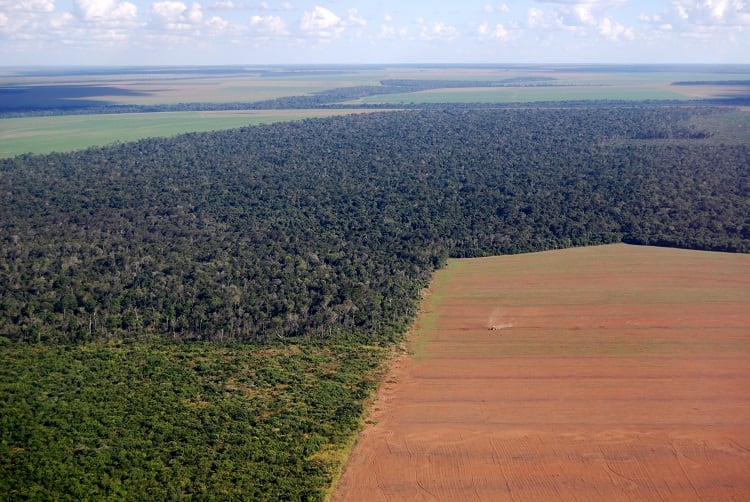
“Not just demanding deforestation-free supply for your own supply chain, but actually demanding that you only buy from sustainable, deforestation-free suppliers.”
By looking beyond one’s own supply chain, Keller argued that a positive change could occur within the entire, global supply chain. “It [should be] part of [a company’s] license to operate, that they are taking this as a core business value and mainstreaming deforestation and conversion-free.
“Much like it’s a core business value for impeccable food safety, health and quality standards. Deforestation, sustainability and responsible soy should be similar.”
China National Cereals, Oils and Foodstuff Corporation (Cofco) is a state-owned food processor, manufacturer and trader. As one of the world’s largest trade facilitators of soy, the company also acknowledges the important role supply chain players can have in implementing change.
“If you want the whole chain to move towards more sustainable production, we recognise there is an important role that we can, and we should, play,” said Cofco’s head of sustainability Wei Peng. This is largely driven by Cofco’s direct access to farmers and the “demand signals” they can covey more easily than FMCGs and retailers.
“We plan to be in the business long-term…and are convinced that sustainable production eventually leads to better and more production in the longer term,” said Peng. Cofco has already observed change in rainfall and temperature patterns in certain parts of Brazil, which she said is interrupting production and affecting yield.
“If that is not managed properly, we will only see worse situations. That won’t help anyone in the supply chain in the long-term, especially the producers.
“To benefit the producers themselves, production needs to take place in a more responsible way.”
Using greenhouse emissions as a ‘hook’ for consumers
Another way of encouraging the scale-up of responsibly sourced soy would be to push the greenhouse gas agenda, suggested dairy cooperative FrieslandCampina.
The Dutch group produces and sells dairy-based beverages, infant nutrition, cheese and desserts across Europe, Asia and Africa. These milk-based products come from cows fed on 100% responsibly sourced soy.
FrieslandCampina also sells dairy ingredients, such as milk powder, to food manufacturers further down the supply chain. Food giants Nestlé and Unilever and two such clients. “They see that deforestation is important, they want to be sure they are doing business with partners in the value chain that have a clear deforestation policy,” FrieslandCampina’s corporate manager of sustainability, Jaap Petraeus, told delegates during the panel discussion.
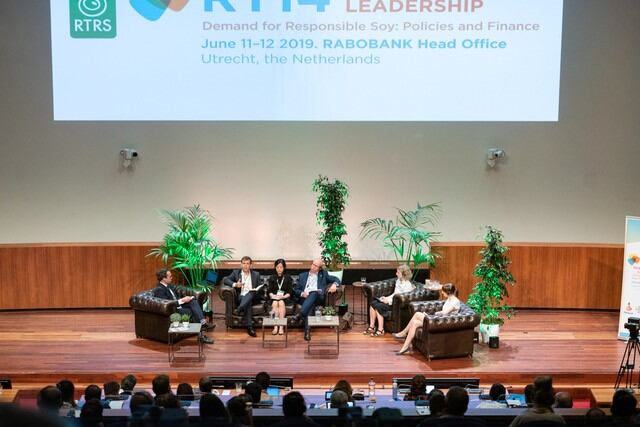
As feed accounts for 90% of the soy imported into Europe, this sector must play a key role in moving towards sustainable sourcing, he argued.
“There is a strict relation between biodiversity, greenhouse gasses and sustainability in soy,” Patraeus continued. “When you calculate the lifecycle analysis of a litre of milk, you can see that quite an important part is the feed of the cow, and also, the greenhouse gas [from] the soy in the feed of the cow.
“When there is more transparency in where the soy is produced, then we can make more claims about the reduction of greenhouse gasses.”
A call for collective action
Swiss food giant Nestlé is both directly, and indirectly, connected to the soy supply chain. It primarily sources soy for its pet food brands, yet is inherently linked to soy via a range of products for human consumption – including its confectionery brands.
“We use milk powder [from FrieslandCampina] in our Kit Kat bar,” the company’s global responsible sourcing leader for cereals, sugar and soya, Madeleine Eilert, told delegates. In this respect, soy can be regarded a “hidden product”, she continued. “And it is the challenge to bring [this awareness] to consumers, so that they see the full picture.”
Nestlé has its own responsible sourcing standard, which sets out clear requirements and expectations for its suppliers. The FMCG works with non-profit Proforest to help manage and source its natural commodities responsibly.
Nestlé also relies on collaboration with its suppliers, such as FrieslandCampina and Cofco, to build awareness of sustainable soy, and ultimately, increase its scale, said Eilert. “One of the key requirements is transparency…it is very important because we can only act and change if we know where the products are coming from.”
Working together is also crucial to having a greater impact, she continued. “Because no one can solve the challenges alone. It is for companies like Nestlé and our suppliers to…engage with NGOs, civil society and producers, to really address the challenges [and] try to find solutions to ‘good”.
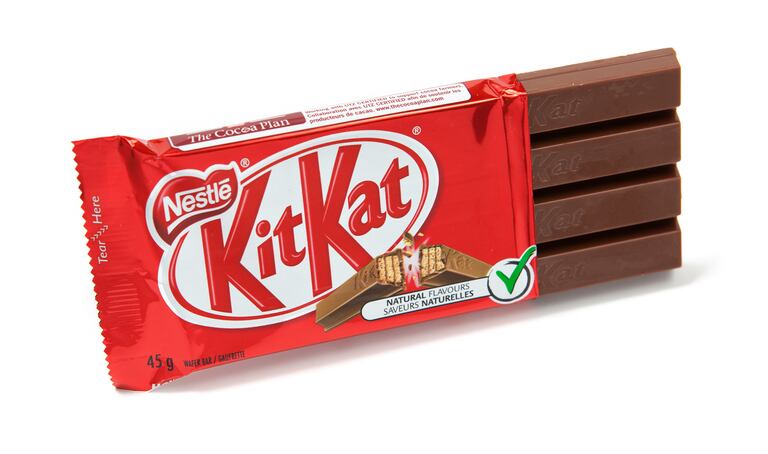
Cofco similarly called for collective action: “We cannot collaborate on every single aspect, but one of the aspects we could possible look at collective action [for] is monitoring and evaluation,” said Peng.
Recognising that the endgame is ensuring “things are happening in the right way, and deforestation is being [identified] and ideally avoided” is the first step, she continued. Joint monitoring and evaluation of these farm-level issues could save both time and money. “There could be some joint action or monitoring that we can agree on, where we don’t work in silos anymore, and work as an ecosystem.”
Creating incentive: ‘A simple request…is not good enough’
Cofco also believes that building scale should be inherently linked to incentives for farmers, particularly in areas where sustainably soy production is not the norm.
China, for example, is a significant player in the soy story – the nation imports 40% of global production. The market signal for responsible production, however, “is not there yet”, said Cofco’s Peng. “So far, we have not received a lot of interest or enquiries from our clients in China around how soybeans are being produced.”
If farmers received financial incentive to produce soy in a more sustainable way, however, Peng believes the industry could see a transformation. “Farmers need to have concrete incentives in order to change their practices.”
This is particularly true in China, where their current agricultural practices are not illegal. To change their practices, we are essentially asking farmers to take risks, Peng continued. “I think a simple request from a supply chain is not good enough.
“It has to be concrete in terms of demand, in terms of premium, in terms of financial economic incentives; it has to be something that is tangible for the farmers.”
This, of course, prompts the question: where does this incentive come from? The answer lies in boosted demand, Peng argued. “I am sure that retailers, consumer brands, traders, milk producers…will react to that demand. There is a new market to be occupied and that is the concrete incentive for the farmers and for everyone along the chain.
“Everyone will be able to benefit from this new market. But…the reality is that this market seems not to be there yet.”


